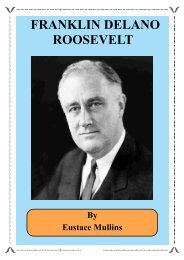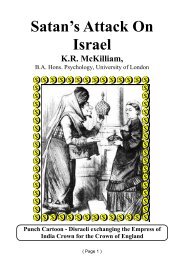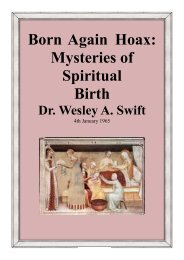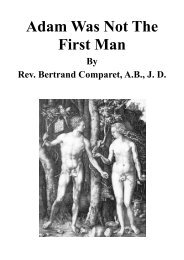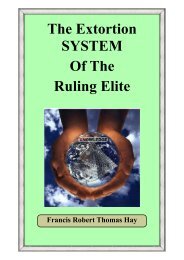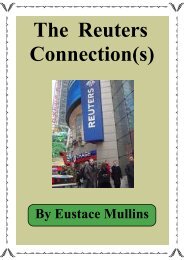Curse of Cannan - The New Ensign
Curse of Cannan - The New Ensign
Curse of Cannan - The New Ensign
You also want an ePaper? Increase the reach of your titles
YUMPU automatically turns print PDFs into web optimized ePapers that Google loves.
now undergoing treatment. <strong>The</strong>y have a half million subscribers who pay at least $15 a month<br />
to PTL, as well as a host <strong>of</strong> other enterprises. Bakker then resigned, calling in Jerry Falwell to<br />
take over PTL, and hinting darkly <strong>of</strong> a "rival evangelist" who was trying to engineer a "hostile<br />
takeover." Yes, it is big business, subject to all the intrigues <strong>of</strong> any pr<strong>of</strong>itable multimillion dollar<br />
operation. Tammy had raised some eyebrows when she made a pathetic national appeal for prayer<br />
to bring her dead poodle back to life! She and her husband had embarked on a whirlwind <strong>of</strong><br />
spending for such things as gold bathroom faucets, huge rings, and other stigmata <strong>of</strong> the true<br />
martyrdom.<br />
Bakker and his fellow operators ask no questions about how all this bounty flows to them. <strong>The</strong>y<br />
preach against "secular humanism" and Communism without any inkling that their evangelical<br />
movement traces directly back to the very forces which they denounce. From 1830 to 1870,<br />
Jeremy Bentham's utilitarian socialism dominated English legislation, while a simultaneous<br />
program, Evangelicalism, was being promoted by the same forces to take over Christianity. Dr.<br />
Dale is quoted by A. V. Dicey in "Law and Opinion in England," Macmillan, 1924, "<strong>The</strong><br />
Evangelicals must encourage what is called an undenominational church-it regarded with<br />
indifference all forms <strong>of</strong> Church polity-it demanded common religious teaching and common<br />
beliefs; it cared nothing for the Church as an august society <strong>of</strong> saints." In short, Evangelicalism,<br />
the forerunner <strong>of</strong> our present crop <strong>of</strong> Canaanite propagandists, was first <strong>of</strong> all, ecumenical;<br />
second, it cast aside the spiritual heritage <strong>of</strong> the Church in favor <strong>of</strong> a robust dedication to fund<br />
raising and political propagandizing for goals rarely openly revealed. <strong>The</strong> Evangelical Alliance<br />
was formed in London in 1846. A branch was soon formed in the United States which was first<br />
known as the Federal Council <strong>of</strong> Church <strong>of</strong> Christ, and is now known as the National Council<br />
<strong>of</strong> Churches <strong>of</strong> Christ, a leftwing propaganda group. Yet it shares the same origin as that <strong>of</strong> the<br />
television evangelists, who claim to be "anti-Communist"! What is this origin?<br />
<strong>The</strong> evangelical movement was sponsored by the same British Intelligence leader, Lord<br />
Shelburne, who had directed the French Revolution. Shelburne imported a French radical into<br />
England, Etienne-Louis Demont <strong>of</strong> Paris, who was the desciple <strong>of</strong> Count Saint Simon, the founder<br />
<strong>of</strong> "social science." Dumont's principal English disciple was Jeremy Bentham, now known as<br />
the "father <strong>of</strong> utilitarianism." Shelburne had become the power behind Britain's political scene<br />
by lending William Pitt, the Prime Minister, large sums <strong>of</strong> money. After Pitt's death, the British<br />
Treasury was obliged to pay<strong>of</strong>f these debts, amounting to forty thousand pounds. Because <strong>of</strong> his<br />
international intrigues, Shelburne was the most feared and hated man in England. Edmund Burke<br />
called him "a Cat aline or Borgia in morals"; he was known publicly by a contemptuous nickname,<br />
"Malagrida"; the press caricatured him as a Guy Fawkes preparing to blow up his own comrades!<br />
Henry Fox called Shelburne "a perfidious and infamous liar." King George III called him "the<br />
Jesuit <strong>of</strong> Berkeley Square." This master <strong>of</strong> espionage used his power to enthrone three men as<br />
the intellectual dictators <strong>of</strong> English life, Jeremy Bentham, John Stuart Mill, and David Ricardo.<br />
Mill was named after Sir John Stuart, a close associate <strong>of</strong> Shelburne, who obtained for both Mill<br />
and his father James Mill high-paying posts with the notorious East India Company. Bentham<br />
was the son <strong>of</strong> a wealthy London lawyer, and lived <strong>of</strong>f his large inheritance. Ricardo was a dealer<br />
in "consols" with-HIs friend Nathan Meyer Rothschild. All three were heavily influenced by<br />
Dumont and Saint Simon's teachings. <strong>The</strong>y worked to create in the nineteenth century the climate<br />
in which collectivism was to flourish in the twentieth century. Dicey points out that "the<br />
fundamental principle <strong>of</strong> collectivism is faith in the intervention by the State in every matter, to<br />
be extended indefinitely." He also pointed out that collectivism meant the end <strong>of</strong> freedom <strong>of</strong><br />
contract. Dicey pointed out in his Lecture IX, "<strong>The</strong> debt <strong>of</strong> collectivism to Bentham-the<br />
machinery was thus provided for the practical extension <strong>of</strong> the activity <strong>of</strong> the State." He pointed<br />
out that Bentham's policies effected the transfer <strong>of</strong> power from the landed aristocracy to the new<br />
middle class <strong>of</strong> merchants and bankers. Bentham taught a system <strong>of</strong> "Hedonic calculus" in which<br />
moral judgments were to be determined only by physical pain and pleasure; he also promoted a<br />
"psychological hedonism" based on the pleasure principle, which denied natural law. Bentham<br />
wrote, "Every person is the best judge <strong>of</strong> his own happiness," presumably indicating<br />
individualism, but his system <strong>of</strong> State control means that a bureaucrat decides everyone's<br />
( Page 118)



